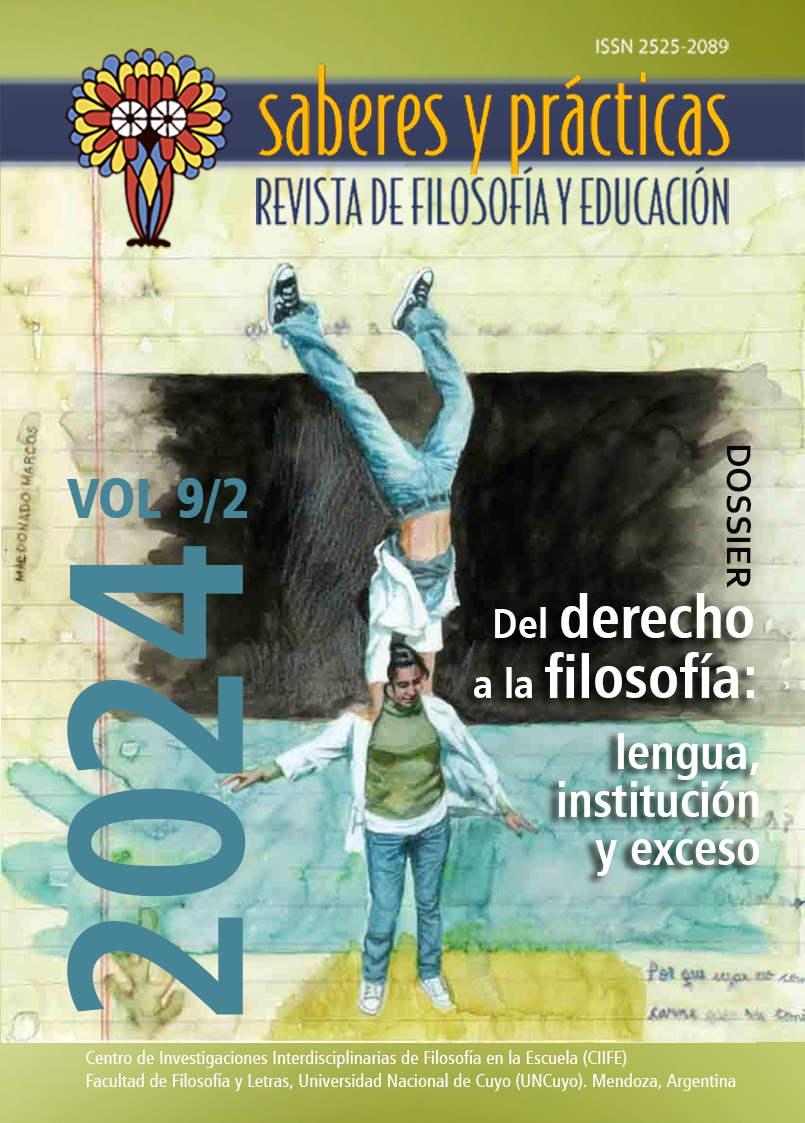Right to Philosophy and Civic Education
Intersections in Privilege or the Right to Philosophy
DOI:
https://doi.org/10.48162/rev.36.130Keywords:
citizenship, philosophy, education, right to philosophyAbstract
Based on the reflection on the multiplicity of meanings that can be extracted from the statement "right to philosophy", Derrida discusses who has the right to it, who legitimizes it, how it is institutionalized and what its limits are. For Derrida, philosophy is mediated by institutions, individuals, and languages authorized to practice it. However, the reflection that this very authorization constitutes a power in itself has been left out. I want to establish a relationship between the right to philosophy and its teaching and the subject of Civic Education in Chile. The thesis of this essay is that the discussion on Civic Education distances itself from reflecting on its own limits, as it does not problematize the institutions that legitimize it. From this arise questions for reflection: How is it expected to educate citizens if it is relegated to the final years, if only some are authorized to practice its exercise? Can citizenship be taught without discussing its limits? Is it possible to conceive of citizenship outside of philosophy? Can institutionalized philosophical exercise be carried out without undermining the very institutions that legitimize it? Derrida's work is suitable for thinking about these issues.
Downloads
References
Arellano, A. (2015). El historial financiero de CAVAL: el meteórico ascenso de la empresa de Compagnon y Dávalos. Ciper Chile. https://www.ciperchile.cl/2015/02/26/el-historial-financiero-de-caval-el-meteorico-ascenso-de-la-empresa-de-compagnon-y-davalos/
Brandi, S. (2008). “Educación ciudadana”. En Arpini, A., Molina, S. (2008). Filosofía, ética, política, educación (pp. 229–236). Qellqasqa Editorial.
Consejo Asesor Presidencial Contra los Conflictos de Interés, el Tráfico de Influencias y la Corrupción. (2015, 24 de abril). Integridad ética y derechos humanos: Informe final (Pdte. Eduardo Engels) (pp. 89–95). https://consejoanticorrupcion.cl/wp-content/uploads/2015/04/Consejo_Anticorrupcion_Informe_Final.pdf
Derrida, J. (2023). Privilegio o del derecho a la filosofía (C. Ávalos V., Trad.). Ediciones UACh.
Duarte, C. (2012). Sociedades adultocéntricas: sobre sus orígenes y reproducción. Revista Última Década, 20(36), 99–125.
Ley Nº 20.911. Crea el Plan de Formación Ciudadana para los establecimientos educacionales reconocidos por el Estado. (2016). https://www.bcn.cl/leychile/navegar?idNorma=1087343
Mineduc. (2021). Programa de estudio Educación Ciudadana. https://www.curriculumnacional.cl/614/articles40122_programa_feb_2021_final_s_disegno.pdf
Rancière, J. (2014). El maestro ignorante: Cinco lecciones sobre la emancipación intelectual. Zorzal y Hueders.
Rubinelli, M. (2008). El carácter transversal de la formación ética y ciudadana. En Filosofía, ética, política, educación (pp. 137–148). Qellqasqa Editorial.
Sepúlveda, Á. (2023). Formación ciudadana a través de la educación: Análisis del plan de formación ciudadana (Ley 20.911). Revista Infancia, Educación y Aprendizaje (IEYA), 9(1), 28–40. https://revistas.uv.cl/index.php/IEYA/article/view/3047
Waksman, V. (1998). Filosofía y crítica en la escuela: una propuesta de formación ética. Linhas Críticas, 4(5-6), 39–62. https://doi.org/10.26512/lc.v4i5-6.2793
Published
How to Cite
Issue
Section
License
Copyright (c) 2024 Daniela Gutiérrez Contreras
This work is licensed under a Creative Commons Attribution-NonCommercial-ShareAlike 2.5 Argentina License.





















